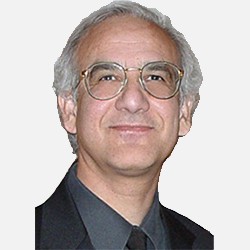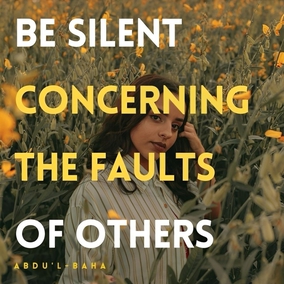The views expressed in our content reflect individual perspectives and do not represent the authoritative views of the Baha'i Faith.
The Secret of Divine Civilization does not advocate for Westernization or for native traditionalist models of development. What does that leave?
In The Secret of Divine Civilization, Abdu’l-Baha defends the culture of modernity—but his definition of modernity is not the same as the prevalent model of Western European societies, nor is his modernity one of blind imitation of old and ossified traditions.
In fact, the most significant feature of The Secret is that it offers a novel concept of modernity, which transcends existing social and cultural patterns. In it, Abdu’l-Baha simultaneously defends and criticizes the Western model of development. He calls for learning and adopting the empirical scientific and technological advances of the West, while he simultaneously attacks the materialistic and militaristic features of the modern Western culture. Similarly, he defends the spirit of indigenous tradition—while rejecting the blind worship and dogmatism of past traditions.
Both modernity and development, therefore, are defined in the Baha’i teachings as a process of rationalization. This progressive rationalization, however, has two distinct but related dimensions. Instrumental or formal rationalization deals with the application of modern science and efficient utilization of the means for the attainment of the ends. However, practical or moral rationalization relates to the development of the moral, spiritual, and communicative capacities of the humans. Authentic modernity, Abdu’l-Baha affirms, is not possible without the combination of material, or formal, and spiritual, or moral, dimensions of civilization:
A superficial culture, unsupported by a cultivated morality, is “a confused medley of dreams,” and external lustre without inner perfection is “like a vapor in the desert which the thirsty dreameth to be water.” For results which would win the good pleasure of God and secure the peace and well-being of man, could never be fully achieved in a merely external civilization. The people of Europe have not advanced to the higher planes of moral civilization, as their opinions and behaviors clearly demonstrate. – Abdu’l-Baha, The Secret of Divine Civilization, pp. 60-61.
But in order to understand the issue better we should investigate more closely the two opposing theories of development. In the history of social and political theory the objectivist/Western model of development is equated with the French philosophy of the Enlightenment. On the other hand, the native traditionalist/historicist theory was first formulated by the Romantic theory. In fact, all major debates on this issue ultimately go back to the fundamental opposition between the 18th century philosophy of the Enlightenment, and early 19th century German Romanticism. Abdu’l-Baha’s position refutes both perspectives and creates a novel synthesis of the positive points of each doctrine.
The philosophy of the Enlightenment was a rationalistic theory. It argued that humans are by nature rational, and that a rational society is one which corresponds to the laws of human nature. For the Enlightenment, application of empirical science, capitalism, and political democracy is the fundamental feature of a rational society. Humans were defined as rational. That meant the fundamental law of human nature is utilitarianism. In other words, the rationalists argued, humans are totally determined and there is no freedom of will. Human behavior is completely determined and predictable because by nature humans pursue pleasure and happiness and avoid pain and suffering. Therefore, humans are rational in the sense that they choose the most efficient course of action to maximize their utility. This static and ahistorical conception of humans became the basis of their political theory. A society was perceived by them to be rational if it would allow individuals to freely pursue their interests. Capitalism, freedom from traditional, moral, and religious restraints became the sacred imperatives of this liberalist theory. Capitalism became the only natural form of society because it was seen to allow competitive pursuit of interests and maximize pleasure for individuals. Therefore, the way for development is to use scientific knowledge to dominate nature and increase human capacity to pursue his pleasure in the context of an unbridled capitalism. Consequently, the philosophers of the Enlightenment maintained, West European societies are the only rational societies. All other cultures and societies are superstitious, backward, and irrational. Major philosophers of the Enlightenment—like Voltaire, Holbach, La Mettrie, Diderot, Condorcet, and Helvetius—supported this basic perspective.
Romantic theory of the early 19th century was a reaction against the excessive and arrogant pronouncements of the “rational” Enlightenment theory. It was based upon an extreme form of historical consciousness, in the sense that it rejected the existence of any universal human nature and defined humans as simply social and historical beings. This meant, for romanticists, that humans were cultural products of a specific society. Society, on the other hand, was primarily an expression of non-rational cultural symbols like language, poetry, music, religion, tradition, and mythology. Each culture was an organic being, having a spirit of its own. No culture could be compared to any other culture, and therefore the only criterion for values became the internal tradition of each culture. What was crucial for the Romantics was to maintain the unity of culture and act in accordance with the unerring dictates of that unitary tradition. Romantics, like Friedrich Schlegel, August Schlegel, Novalis, and Schleiermacher, opposed the emerging industrial and democratic order in Europe and called for monarchism, a return to medieval class system and religious traditions.
Abdu’l-Baha’s concept of modernity and development qualitatively differs from both these immoderate and one-sided theories. In his conception of humans, he defines us in terms of the interaction of both rational and normative orientations. Humans are in fact historical beings, but this historical orientation becomes the basis of a progressive and open perspective and, unlike the Romantics, it does not end in blind worship of tradition. The dynamic flow of history implies that at each stage of its development humanity must actualize its potentialities for that time, and that requires adaptation to the objective requirements of the time.
The Baha’i teachings, then, affirm the beauty of all cultures. Baha’is believe we should learn the creative lessons of the spirit of all cultures and their traditions in order to move forward. Both historicity and respect for the creative spirit of cultures and religions call for a progressive attitude. However, this progressive attitude is not the same as the philosophy of the Enlightenment. For Abdu’l-Baha, the Enlightenment’s conception of humans is too materialistic, selfish, and mechanical. Humans are motivated by both normative values and rational considerations. For Baha’is the meaning of life, unlike the theory of the Enlightenment, is not one of insatiable consumption. Such a life is spiritually impoverished and morally corrupt.
So from a Baha’i perspective, the most problematic feature of Enlightenment theory is its narrow definition of rationality. Rationality is only defined in terms of instrumental and formal rationality, and the idea of practical and moral rationality is entirely overlooked by the philosophers of the Enlightenment. Consequently, Abdu’l-Baha’s notion of development and modernity is one of progressive rationalization—which includes both the mind and the soul.
















Comments
Sign in or create an account
Continue with Googleor